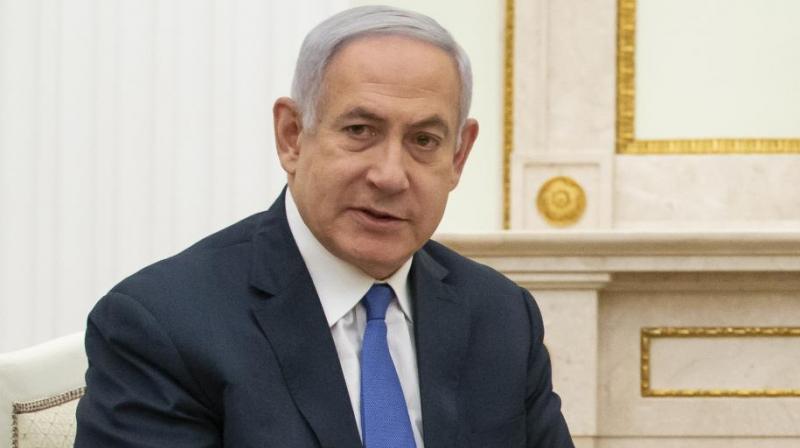‘Magician’ Bibi likely to face stormy days ahead

The April 2019 election victory is a remarkable one for Israel’s Prime Minister Benjamin Netanyahu. Having won his fourth campaign in a row, this victory affirms the extent to which he has conflated his own persona with the position he has held uninterrupted for the last 10 years.
There were certainly signs of “Netanyahu fatigue” during the campaign. Former Israeli Defence Forces chief Benny Gantz had got into the electoral fray just three months earlier and still ran neck-and-neck with Mr Netanyahu throughout the campaign. And, of course, Mr Netanyahu was carrying the burden of possible criminal indictments — for bribery, fraud and breach of trust — by the attorney-general.
Mr Netanyahu’s Likud party got over a million votes, an Israeli record for a single party, and obtained 36 seats in the 120-member Knesset, just one more than Mr Gantz’s Blue and White party. But, where Mr Netanyahu scores over his rival is his ability to bring into his coalition almost all the right-wing groups — the ultra-right as well as the religious parties — five of them with just four to eight seats between each of them will give the Prime Minister 29 seats altogether, providing him with an unassailable majority with 65 seats.
Mr Netanyahu has projected himself as a hardline, no-compromise leader, openly privileging Jews over Arabs, advocating force to combat Palestinian aspirations, and generally opposing all avenues for the promotion of the peace process. During his rule, the peace process has been neutralised, Israel’s own “Peace Now” movement has ceased to exist, and there has been a steady encroachment of settlements in the occupied areas, alongside annexation into Israel when required.
Condemning his opponents as soft and feeble “lefties”, he stated proudly during the recent campaign that he was making Israel a “world force” not through compromises, but by radiating “power, pride, commitment”. According to Israeli writer Akiva Eldar, Mr Netanyahu has over 10 years sowed deep fear and hatred in the minds of ordinary Israelis that is almost impossible to uproot.
Another Israeli commentator Raphael Ahren, writing in the Times of Israel, has noted that in this election religion and racial prejudice played a key role in ensuring right-wing victory. Religious parties freely invoked faith and even promised a “place in heaven” to those who voted for them.
Mr Netanyahu ranted about Mr Gantz putting together a left-wing government, backed by Arabs. He proudly justified the use of hidden cameras by his supporters in Arab polling stations, suggesting that Arabs were more capable of electoral fraud than other voters.
Clearly, Mr Netanyahu had in US President Donald Trump an effective campaign manager — after announcing the shift of the US embassy to Jerusalem last year, just two weeks before polls, Mr Trump accepted Israel’s annexation of the Golan Heights, signing his proclamation to this effect at a formal event at the White House on March 25, with a beaming Mr Netanyahu standing behind Mr Trump and applauding vigorously. Thus inspired, on April 7, two days before voting day, Mr Netanyahu said that after his victory he would annex to Israel all Jewish settlements in the West Bank.
The campaign was centred around the Prime Minister, with committed supporters enthusiastically extolling his achievements. All references to Mr Netanyahu’s corruption were rubbished on the basis of his security record, while criticisms that he was divisive and embraced bigots were responded to with the riposte “lefties”.
In fact, given Mr Netanyahu’s standing, the Opposition could barely muster the courage to criticise the Prime Minister or even suggest an alternative programme to deal with pressing matters confronting the country. Thus, Gil Troy has said in the Jerusalem Post that both the campaign and the results are “depressing” — no interesting vision for the nation was put across, nor was there any discussion on working with Palestinians and ways to achieve real security for the nation.
What do four more years of Mr Netanyahu bode for Israel and the region? First, there are doubts that he will actually have four years: in July, he will get a chance to respond to the criminal charges after which the attorney-general will decide whether to go in for a criminal trial. This might require the Prime Minister to step down, though his supporters believe he will brazen it out and continue as Prime Minister and defence minister while court proceedings continue.
But criminal proceedings could break his coalition, with rivals within the government pressing their claims. If the government collapses, we could even see elections within a year. However, some observers have suggested that Mr Netanyahu could attempt to appease his partners by going in for large-scale annexations of the occupied territories in return for a law that grants him immunity from criminal proceedings.
The next challenge before Mr Netanyahu will be the announcement of the US “deal of the century” to address Palestinian aspirations. This detailed plan is expected to be released very soon, possibly just after government formation. It could largely serve Israel’s interests by providing for the annexation to Israel of large parts of the West Bank. However, there are indications that it could propose detachment of some suburbs of east Jerusalem to be the capital of the Palestinian state, which is likely to be anathema for Mr Netanyahu and his right-wing colleagues.
Finally, there are suggestions that Mr Netanyahu may succeed in his “divide-and-rule” approach to the Palestinians by annexing much of the West Bank and looking at a deal with the Hamas in Gaza. In terms of this agreement, Hamas would give up confrontation and violence in return for removal of its “terrorist” branding and the ongoing blockade, backed by massive international investments to develop ports, airports, industrial zones, fisheries, etc.
This will ensure that Mr Netanyahu does not need to participate in any peace discussions with the Palestinian Authority in Ramallah, which he continues to stigmatise as a supporter of terrorists.
Mr Netanyahu’s main challenges lie ahead of him. Israeli commentator Ben Caspit has described him as “the greatest of Israel’s political magicians of all time”. In the coming months, this magician will need all his skill in this the second campaign to retain power gained at the polls.

